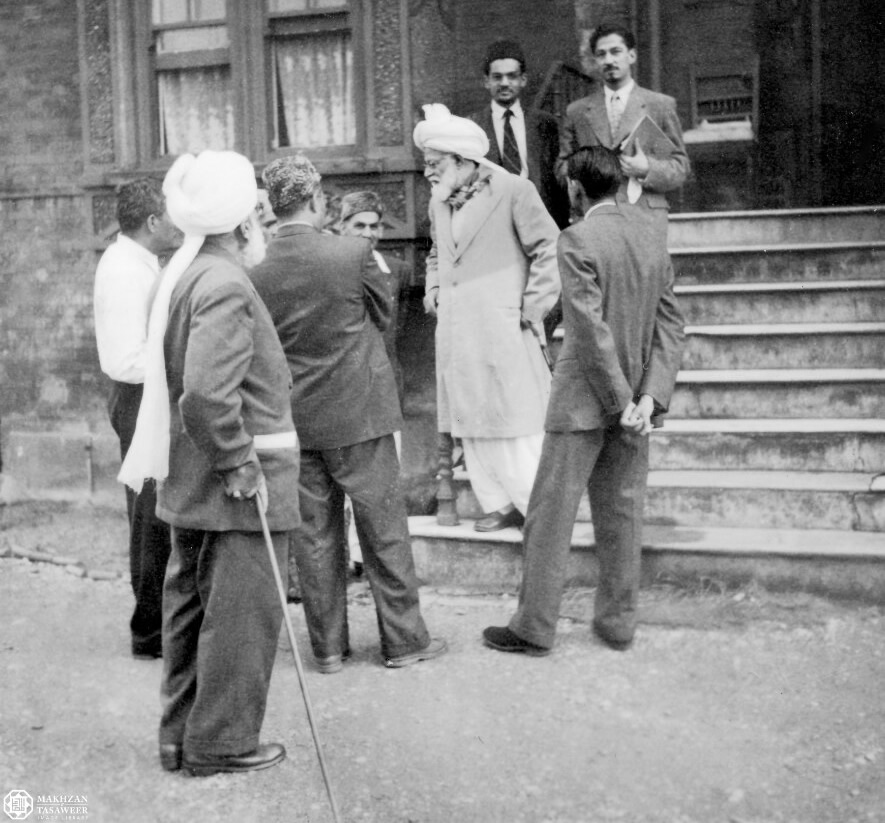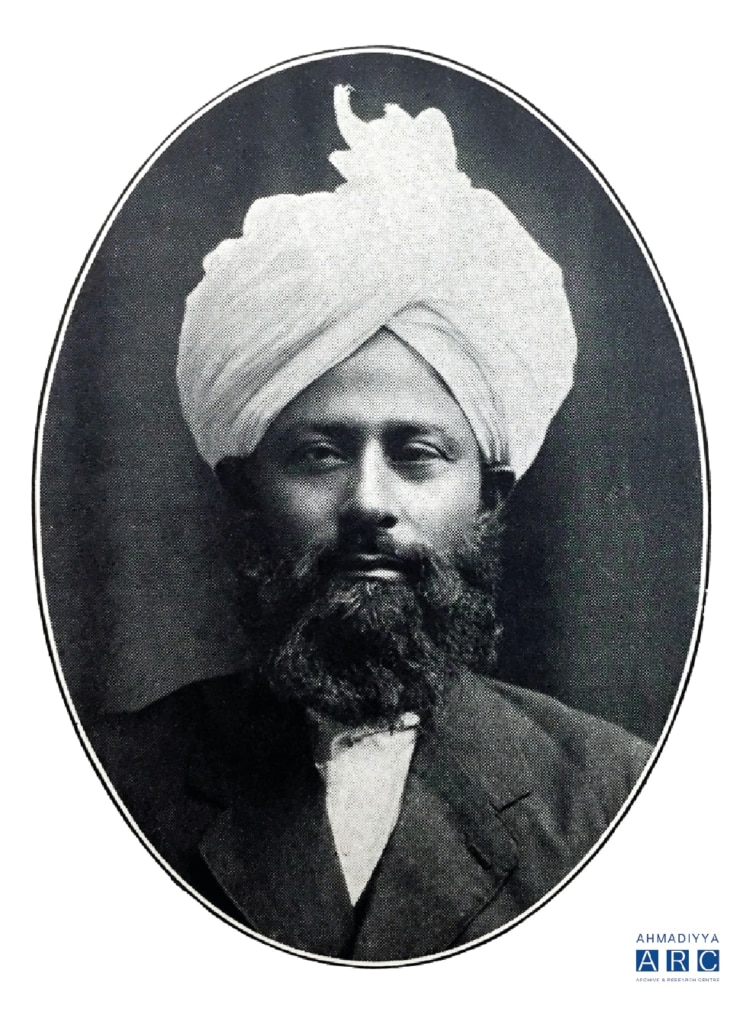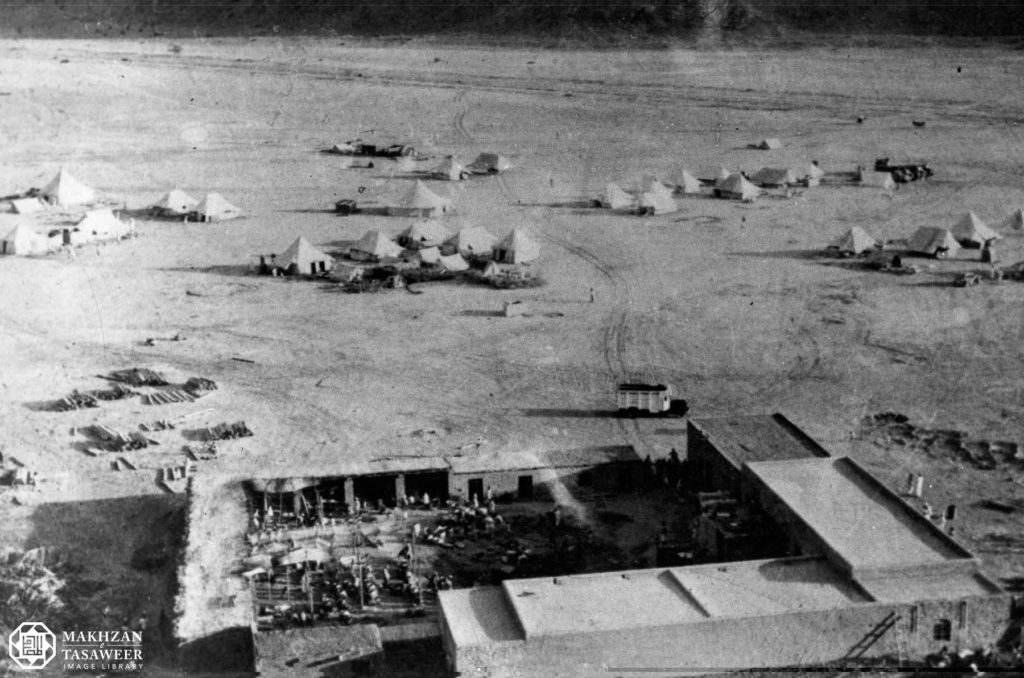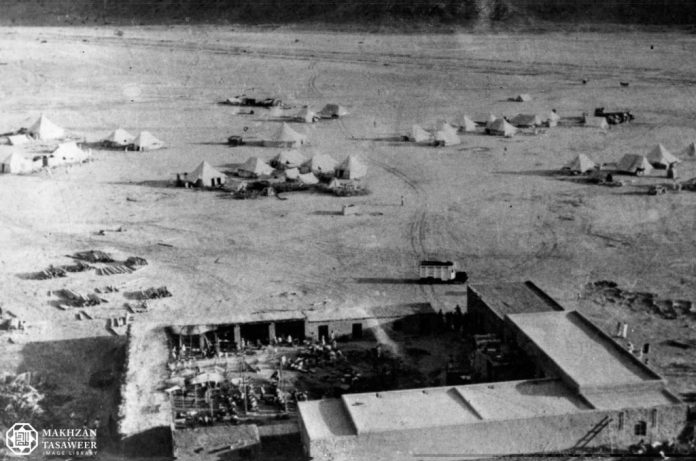Narrated by Syed Mir Mahmud Ahmad Nasir Sahib, son-in-law of Hazrat Musleh-e-Maudra. Al Hakam is grateful to Syed Mir Mahmud Sahib for sharing his personal recollections of a great
Syed Mir Mahmud Ahmad Nasir

A personal problem
Aside from many other reasons, it is difficult to say anything about Hazrat Musleh-e-Maud, may Allah be pleased with him, because he was a universe in himself and an ocean of knowledge. I remember his great personality and become anxious as to whether I can even describe him adequately or whether I will be able to explain his characteristics completely and draw a sufficient sketch in the minds of readers and listeners.
Given the situation, how can a person express such a vast, diverse and deep personality? This is a hurdle and I think that I will not be able to fulfill the responsibility of this article. Once, I reached for a notebook to write something, but I was not able to do it. One of the reasons was that I was afraid that I would not be able to fully introduce a great being like him. Another reason was that I could not stop my tears when remembering the compassion and kindness of his majestic personality. A personal hindrance in writing is that though I have seen Hazrat Musleh-e-Maudra myself, I have also heard a lot of things in the house from my elders over an extended period of time.
Verbal accounts are equally important, but I am afraid that when people hear them from me, they will start considering them as my eyewitness accounts. Careful consideration of the narrated accounts is very necessary. In response to a man’s query about Hazrat Musleh-e-Maudra while I was serving in the United States, I said that I had not witnessed any prophet with my material eyes, but the closest person I had seen to a prophet was Hazrat Mirza Bashiruddin Mahmud Ahmadra, whom I observed closely.
Love of God
Regarding Hazrat Musleh-e-Maud’sra love for his Lord, I would say that people do remember God, but at times, they tend to forget Him. However, Hazrat Khalifatul Masih IIra states:
سوؤں تو تجھ کو دیکھ کر، جاگوں تو تجھ پہ ہو نظر
موت سے تھا کسے دریغ، اُس کا ہی انتظار تھا
“I go to sleep looking at You [God] and when I wake, You are my focus. I am not reluctant to die because am waiting for death [so that I may meet You].” (Kalam-e-Mahmud, p. 182)
Some people used to call Hazrat Musleh-e-Maudra a prophet owing to their innocence or deep affection for him. For instance, Chaudhry Ghulam Sarwar Sahib, who belonged to Sialkot, used to say that Hazrat Musleh-e-Maudra did not call himself a prophet because of his humility, but people should call him a prophet. I [Syed Mir Mahmud Ahmad Nasir Sahib] have also heard one such incident that listening to similar discourses, Hazrat Musleh-e-Maudra said, “Some people call me a prophet, but I am certainly not a prophet,” but after a short pause he stated, “I wonder whether the love of God I have in my heart is somehow less than that of prophets?”

He had a yearning for attaining God’s love. Though I am not an eyewitness, I have also heard another incident that occurred in Qadian. Once, Hazrat Musleh-e-Maudra became very ill. There were frequent announcements in the newspaper and requests for prayer were made. A regular pronouncement was published by Hazrat Amma Janra that her son, Mahmudra was ill. After some time, Allah the Almighty blessed him with good health. He visited the house of Hazrat Umm-e-Tahirra for a formal meal. Food was served, but he would not eat it. In fact, he would not even pay heed towards it. His family members requested him to start eating. Then in a very unique manner, expressing great displeasure, he told his relatives upon their repeated requests, “I was sick; I was to die and meet my God I was to see Him, but you all prayed and my health was restored.”
He said this due to his passion of beholding the Divine. The narrator of the incident states that he left without eating any food.
Greatness and glory
I will now describe a bit about the feeling people used to experience when they would see Hazrat Musleh-e-Maudra and the way they would observe him. To put it briefly, they used to experience a kind of grandeur, spiritual elevation, splendour, magnificence and dignity. It was as if a person was standing beneath a great mountain of the Himalayas and the mountain was about to come tumbling on them. However, looking closely, people would be filled with the certainty of affection, compassion, benevolence and kindness. This is not just my personal impression, rather just as has been said [to the Promised Messiahas]:
نُصِرْتُ بِالرعْبِ
“You have been helped with prestige”, similarly, he too had an awe-inspiring personality that was full of grandeur, glory, excellence and honour. When I imagine the pure life, prominence and magnificence of Hazrat Musleh-e-Maudra, the following verse of the Holy Quran comes to mind:
الَّذِیۡ خَلَقَ سَبۡعَ سَمٰوٰتٍ طِبَاقًا ؕ مَا تَرٰی فِیۡ خَلۡقِ الرَّحۡمٰنِ مِنۡ تَفٰوُتٍ ؕ فَارۡجِعِ الۡبَصَرَ ۙ ہَلۡ تَرٰی مِنۡ فُطُوۡرٍ۔ ثُمَّ ارۡجِعِ الۡبَصَرَ کَرَّتَیۡنِ یَنۡقَلِبۡ اِلَیۡکَ الۡبَصَرُ خَاسِئًا وَّ ہُوَ حَسِیۡرٌ
“… Who has created seven heavens in harmony. No incongruity canst thou see in the creation of the Gracious God. Then look again: Seest thou any fl aw? Aye, look again, and yet again, thy sight will return unto thee only confused and fatigued.” (Surah al-Mulk, Ch.67: V.4-5)
For 52 years, Paighamis [otherwise known as Lahori Ahmadis] and non-Ahmadi scholars kept trying to find faults in Hazrat Musleh-e-Maudra but were unable to do so. I remember one scene vividly. I was a bit late for Friday prayer. Normally, we used to reach the mosque before the arrival of Hazrat Musleh-e-Maudra. He would come and then the muazzin would make the call to prayer. Huzoorra would wait by the pulpit and then stand up to deliver the sermon. On that specific day, I saw that the Huzoorra departed to lead the Friday prayer. There were some guards with him and some other elders of the Jamaat.
As I was also walking behind him at some distance, I noticed a civil servant. This person probably worked for the post or the telegram office and they would wear khaki uniforms in the winter season. He came on a bicycle and immediately got off when he saw Huzoorra and quickly set his bicycle up against the wall. Huzoorra did not see him and only I was watching the spectacle. The man, who was a Hindu, fell prostrate on the ground, due to the glory and radiance of Hazrat Musleh-e-Maudra. In one of his writings, the Promised Messiahas has stated about Hazrat Musleh-e-Maudra that God would send him with His Word of Majesty [“He is the Word of Allah, for Allah’s mercy and honour have equipped him with the Word of Majesty.” (Announcement, 20 February 1886)].
Intelligence
The third impression that I have in my heart was the extraordinary intelligence of Hazrat Musleh-e-Maudra. You cannot even gauge the scale of Huzoor’sra intelligence. I can try and explain with the example of a light bulb, that once it is switched on, a time comes when its light goes off, but the intellect of Hazrat Musleh-e-Maudra was constant and kept progressing without stopping. I will relate a small incident of his intelligence.
In 1955, Hazrat Musleh-e-Maudra was ill and he travelled to London. At the time, I was already there and had the pleasure to prepare a house for his accommodation. Some other friends were also accompanying him … There was a person who was associated with the Jamaat and a service was entrusted to him. Later on, he abandoned the Jamaat. It took me six months to understand this person. After a whole six months, I understood the mentality of the person and what he wanted.
However, when Hazrat Musleh-e-Maudra came to visit, one day, that person handed me a letter placed in an envelope, which, instead of the private secretary, he wanted me to directly deliver to Huzoorra. Hazrat Musleh-e-Maudra opened the envelope, but only a little bit; he did not open it entirely. He must have seen only a small part of the letter inside and immediately, he closed the letter and told me in detail about the person’s intentions. It was the same impression which took me a full six months to assess. That person later turned out to be exactly as Huzoorra had described.
“He was a very impressive personality”
Regarding the astuteness of Hazrat Musleh-e-Maudra, I wish to narrate the case of a non-Muslim scholar-priest. He was Kenneth Cragg whose book, The Call of the Minaret is quite famous. A few years ago, when I went to England, Asif Mahmood Basit Sahib told me that Kenneth Cragg was alive. I was surprised as I thought that he would no longer be alive. He was a very old person.

This gentleman was then living in an institution built for the elderly. I went to meet him with Asif Mahmood Basit Sahib. This author was a very well-known and renowned figure. He was also known in the intellectual circles as well as the Christian circles. Accompanied with Hazrat Sir Chaudhry Zafarulla Khan Sahibra, he once came to meet Hazrat Musleh-e-Maudra. I reminded Kenneth Cragg that he met Huzoorra in the year 1955. He had only one remark:
“He was a very impressive personality.”
Now, he was an elderly learned man and a famous priest who worked against Islam. His testimony about the personality of Hazrat Musleh-e-Maudra was that he was impressive, even though he remained in the company of Huzoorra for a very short period of time.
Knowledge of the Holy Quran
Those who have read his commentary of the Holy Quran, Tafsir-e-Kabir are well aware of this aspect of Hazrat Musleh-e-Maud’sra personality. It was this field in which he was a vast ocean of knowledge. Despite his illness, health and many other engagements, Hazrat Musleh-e-Maudra used to regularly deliver his dars [sermon] of the Holy Quran in Qadian twice a day. A trunk of already prepared notes and references was ready before the preparation of Tafsir-e-Kabir’s volumes. When conditions began to worsen during the partition of the subcontinent, Hazrat Musleh-e-Maudra had already recognised the course of changing circumstances with his wisdom and foresight, and a small plane had been purchased for the Jamaat. Syed Muhammad Ahmad Sahib, son of Hazrat Mir Muhammad Ismailra used to fly it.
Once, Hazrat Musleh-e-Maudra called him and asked, “How old are you, Muhammad Ahmad?” After hearing his reply, Huzoorra said, “A person can understand things at such an age. The trunk containing the notes of Tafsir-e-Kabir is placed right there. This is the basis of the Holy Quran’s interpretation for the next 1,000 years. Take this trunk from Qadian to Lahore by plane and there, tell Sheikh Bashir Ahmad Sahib to deposit it in a bank.
Even his rivals were convinced about this aspect. So what more can I say regarding Hazrat Musleh-e-Maud’sra knowledge of the Quran! Hard work How do I write about this and explain it? [I recall] an instance of Rattan Bagh, Lahore. Once, after Isha prayer, Hazrat Musleh-e-Maudra quickly came down and Chaudhry Ishaq Sahib was keeping guard there. After the partition, there was an ordinary security arrangement, with only a couple of men available for the security duty in every shift.
Chaudhry Ishaq Sahib himself related this incident to me that Hazrat Musleh-e-Maudra told him, “Ishaq, I am engaged in important work. I have to send it to London by tomorrow morning. Due to this work, I sometimes lose track of time. So do this; come upstairs every hour and remind me of the time.” Ishaq Sahib told me, “I went in at 9 o’clock and Hazrat Musleh-e-Maudra was working. Again, I went in at 10 o’clock and he was working. I kept visiting him every hour, 11 o’clock, 12 o’clock, 1 o’clock, 2 o’clock, 3 o’clock and 4 o’clock – each time, I found him working. Then at 5 o’clock, Huzoorra said that it was enough and started to offer his prayers.”
On many occasions, Maulvi Abul Munir Nurul Haq Sahib had the opportunity to work with Hazrat Musleh-e-Maudra. He had the privilege to be actively involved in the work of finding various references for Tafsir-e-Kabir. In one of his lectures at Jamia, he stated his observation of Hazrat Musleh-e-Maudra in simple words that Huzoorra used to work all day and night, and he would only rest from 5 to 8 o’clock in the morning.
Likewise, my father, Hazrat Mir Muhammad Ishaqra was gracious to me in that many of his works that were to be presented before Hazrat Musleh-e-Maudra, he used to deliver them to Huzoorra through me, instead of sending them through the private secretary. He would send me to ask about specific matters. As usual, he sent me one day and as I entered, I saw Hazrat Musleh-e-Maudra seated on the floor. In front of him was a pile of letters, almost two and a half feet high.
Similarly, the mother of Hazrat Mirza Tahir Ahmad, Khalifatul Masih IVrh [Hazrat Umm-e-Tahir, Syeda Maryam Begum Sahibara] was seated at a distance of two to three yards and there was a heap of letters in front of her as well. I noticed that Hazrat Musleh-e-Maudra would read out a letter from the envelope, put it back in the same envelope and write the response on top of the envelope, which was later sent to the people in the form of proper responses through the staff members of the private secretariat. That day, I saw that in between the short period of time when Huzoorra would open the letter and place it back into the envelope, Hazrat Umm-e-Tahirra would read out a letter expressing that the sender had written about such and such subject and in this manner, would seek guidance from Huzoorra. Huzoorra would explain to her how to reply.
In the meanwhile, Huzoorra affectionately joked with me, listened to my father’s question and guided me in this regard. The work of correspondence continued side by side. No one should consider this description of the “piles of letters” as an exaggeration. I wish to make it clear that Hazrat Khalifatul Masih IIIrh received 55,000 letters only in the very first year of his Khilafat and that is not all; he said that he read all those letters, dictated the answers and sent replies to all of them.
Hazrat Nawab Mubaraka Begumra has stated in her poem regarding Hazrat Musleh-e-Maudra:
قومِ احمد جاگ تُو بھی، جاگ اُس کے واسطے
اَن گنت راتیں جو تیرے درد میں سویا نہیں
“Wake up O ye nation of Ahmad! Wake up for that person who has not slept countless nights in your pain.”
This is the exact reality. He passed many nights without sleep. There was a non-Ahmadi who came to Qadian and later became Ahmadi; he used to publish books, like Al-Wasiyyat, Durr-e-Samin and Kishti-e-Nuh etc. that were permitted by Sadr Anjuman Ahmadiyya. He was a very nice person. He used to carry out very interesting discourses. When he came to Qadian before he embraced Ahmadiyyat, he said after spending some time there, “Your Mirza is a liar.”
Everyone was shocked to hear these words. They turned towards him and insistently enquired, “What do you mean by this, that Mirza Sahib lies!”
He said, “Mirza Sahib stands up to carry out a speech and tells [the audience] that he is ill; that his health is poor and then he delivers an eight-hour speech!”
I have personally heard those speeches. After offering the Zuhr and Asr prayers, the speech would begin after the recitation of the Holy Quran. It would continue until the time for Isha, and even then, the speech would continue and no one in the audience would leave the gathering.
Regarding such occasions, an elderly person expressed to Hazrat Musleh-e-Maudra, “I sit down to listen to your speech. You explain a point. I listen to that point carefully. But I also have bladder issues and I am old. Thereafter, you start explaining another matter. I sit down again to hear it as well. As soon as it ends, the next one starts and I cannot leave to answer the call of nature. At last, it becomes extremely impossible [for me to hold it any longer].”
I was present at the scene when Hazrat Musleh-e-Maudra was attacked with a dagger. I ran towards the house of Dr Mirza Munawar Ahmad Sahib to report the attack on Huzoorra. When Huzoorra was shifted to the upper storey of the house, I had the opportunity to serve him for some days. At that time, I remember that despite such a near fatal attack, there were only a few days before Hazrat Musleh-e-Maudra resumed his work again.
(To be continued)
(Transcribed by Tariq Hayat. Translated by Junaid Ahmad Warraich)












